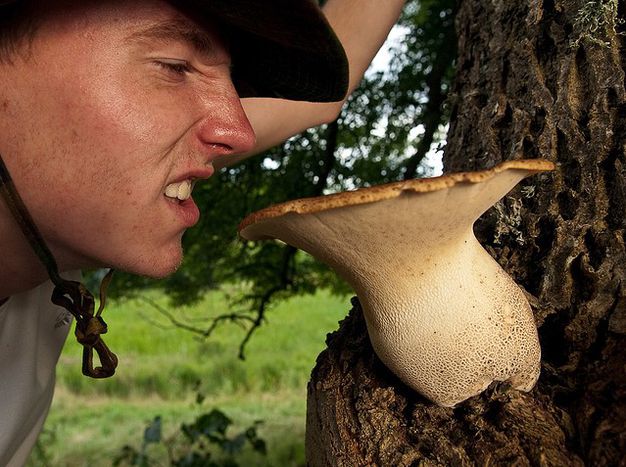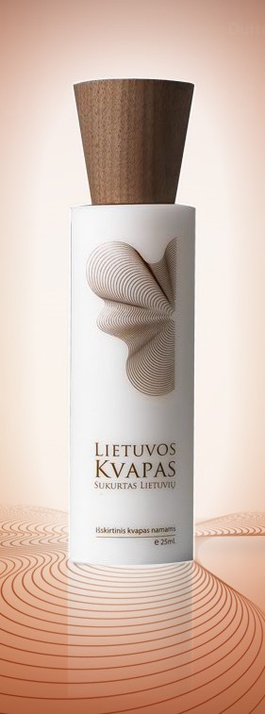
Smelling Lithuania: perfume new 'national symbol'
Published on
Translation by:
Cafebabel ENG (NS)The Lithuanian foreign ministry is angling for something more than its tired coat of arms – evoke musk, moss and you’re halfway to the 'Smell of Lithuania', which has already reached the nostrils of international ambassadors and soldiers in Afghanistan. Tourists are next to be sprayed
Something’s in the air in Lithuania. The special waft which goes by the name of Lietuvos kvapas (‘Lithuanian perfume’) is a heady mix of musk, sandalwood, cedar and other similarly exotic ingredients. It’s with this fragrance that the southernmost Baltic country wants to conquer the world.
 At first glance the white bottle with the brown lid looks just like any other perfume bottle. But the product’s manufacturers say it’s more than just a scent: this is a national symbol. ‘Lietuvos kvapas is right up there with symbols such as the Lithuanian coat of arms, flag or national hymn, 'gushes marketing expert Mindaugas Stongvilas, who came up with the initial concept. ‘You can see, hear and hold those things, but you can’t smell them. Lietuvos kvapas will access a far more important sense of people.’ The nation of 3.2 million want to market the perfume globally. Stongvilas believes that national symbols up until now have little suited. ‘The colours of the Lithuanian tricolor are a quite unremarkable yellow, green and red, other countries have similar flags. The armour-clad knight on horseback in our coat of arms reflects a Europe of former times, and doesn’t help either in differentiating Lithuania from other countries. The composer of our national hymn was no composer or musician, but a doctor and poet! As a consequence our hymn just sounds like others,’ he rails.
At first glance the white bottle with the brown lid looks just like any other perfume bottle. But the product’s manufacturers say it’s more than just a scent: this is a national symbol. ‘Lietuvos kvapas is right up there with symbols such as the Lithuanian coat of arms, flag or national hymn, 'gushes marketing expert Mindaugas Stongvilas, who came up with the initial concept. ‘You can see, hear and hold those things, but you can’t smell them. Lietuvos kvapas will access a far more important sense of people.’ The nation of 3.2 million want to market the perfume globally. Stongvilas believes that national symbols up until now have little suited. ‘The colours of the Lithuanian tricolor are a quite unremarkable yellow, green and red, other countries have similar flags. The armour-clad knight on horseback in our coat of arms reflects a Europe of former times, and doesn’t help either in differentiating Lithuania from other countries. The composer of our national hymn was no composer or musician, but a doctor and poet! As a consequence our hymn just sounds like others,’ he rails.
Stongvilas and co. came up with the idea of creating something truly new during the preparations of Lithuania’s thousand-year anniversary in the summer of 2009. ‘Lithuania has an image problem,’ he explains. ‘We’ve always been on the lookout for a new identification symbol, but haven’t managed thus far. That’s when a few colleagues and I decided to come up with a scent, it was impossible not to follow it through.’ But the perfume has not yet been Made in Lithuania. The first thousand bottles were manufactured in the traditionally famous perfume capital of Grasse in southern France, to fulfil the Lithuanians’ olfactory wishes. In particular, the creators wanted a smell akin to fire, moss and wild plants. ‘It reminds us of our old pagan rituals,’ says Stongvilas. He brushes aside the fact that the majority of the ingredients of this national perfume don’t actually come from Lithuania. ‘We’ve been guided by emotional and symbolic values. For example sandalwood is associated with India and the ensuing Indo-European language, which the Lithuanians have always been ancient representatives of. Cedar symbolises constancy and musk stands for confidence, qualities which have never lacked in our population.’
The majority of the ingredients of this national perfume don’t actually come from Lithuania
The comical idea has had some resonance. The foreign ministry in Vilnius has sent fragrance samples to all of its Lithuanian embassies, stretching even to a perfumed kiss to their soldiers in Afghanistan. They’re also stocked in hotels and airports, whose guests and passengers have had the pleasant surprise of catching a whiff of Lithuania immediately upon entering their rooms or halls.
An article by n-ost correspondent Berthold Forssman
Images: main (cc)Kenny Møller/ Flickr; perfume ©lietuvoskvapas.lt
Translated from Duftmarke Litauen: Meine Hymne, meine Flagge - mein Parfüm!



